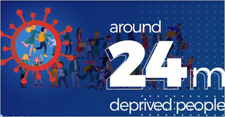Real Economy: Helping Europe's poor cope with COVID

date: 18/06/2020
In 2019, 5.6% of the EU’s population or around 24 million people were deprived. Bulgaria (19.9%), Greece (15.9%) and Romania (12.6%) had the highest levels of severe deprivation in the EU last year. It's predicted that the coronavirus pandemic will significantly increase the number of deprived people in Europe and make it harder for those who are already struggling. This risk is especially high for young people, those with low levels of education, and single parent families, especially those headed by women. The Fund for European Aid to the Most Deprived (FEAD) was set up to provide €3.8 billion in EU funding for food or basic material assistance support to the most disadvantaged groups in Europe. According to Maria Joao Rodriguez, President of the Foundation for European Progressive Studies, to protect young people we need to ensure that their temporary contracts are extended over time, while to protect single parents we need to extend layoff schemes. Rodriguez adds that we need to “make sure that SMEs particularly, are directly supported with the financial means to survive and to relaunch their activities…and that minimum income schemes will work everywhere to make sure that everybody will be protected from falling into poverty.”
